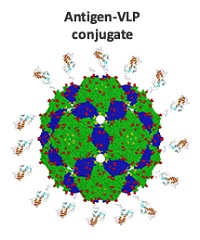 |
| Courtesy of Cytos Biotechnology |
Checkmate Pharmaceuticals last week announced the receipt of $20 million in Series A financing to support development of a licensed oncology candidate (CYT003) and associated virus-like particle platform, as well as technologies for VLP delivery.
The candidate and particles are licensed from Cytos Biotechnology. The particles are derived from bacteriophages (viruses that infect bacteria) and are produced at large scale with the help of E.coli bacteria, the Cytos website says.
Independently produced antigens are conjugated to the VLP particles' surface using a chemical linker. The VLPs then present the antigen to B-cells, hopefully resulting in a strong immune response.
Cytos is developing CYT003 to treat allergic asthma (though it last year failed a Phase II clinical trial for that indication), while Checkmate Pharma is exploring oncology applications.
"Our data indicate that CYT003 and the VLP technology platform will enhance the efficacy of checkpoint inhibitors such as anti-PD-1 and anti-PD-L1 antibodies, addressing a critical unmet therapeutic need in immuno-oncology and providing a better set of treatment options for patients with cancer," said Dr. Art Krieg, CEO of Checkmate in a statement.
The VLP platform is also the subject of a collaboration between Novartis ($NVS) and Cytos, centered on the Big Pharma's Phase II injectable Alzheimer's candidate, which won't be reviewed by the FDA for approval until 2019 at the earliest.
Pfizer ($PFE) and the government of Singapore are also deploying the platform in their vaccine candidates.
Though it now has $20 million and the backing of lifescience VCs Sofinnova and venBio, the early-stage company remains a fairly mysterious player at this point.
According to the financing's release, "The company is leveraging their expertise and the vast body of knowledge in the field of CpG oligonucleotides and is validating an approach that will combine the ability of CpG DNA to activate an anti-tumor T cell response with checkpoint inhibition to overcome a tumor's ability to mute the immune response."
CEO Dr. Krieg discovered CpG DNA in 1994.
- read the release